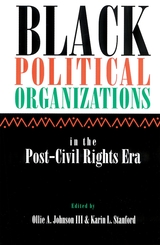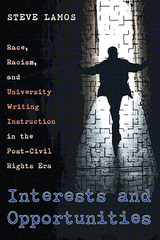
We know a great deal about civil rights organizations during the 1960s, but relatively little about black political organizations since that decade. Questions of focus, accountability, structure, and relevance have surrounded these groups since the modern Civil Rights Movement ended in 1968. Political scientists Ollie A. Johnson III and Karin L. Stanford have assembled a group of scholars who examine the leadership, membership, structure, goals, ideology, activities, accountability, and impact of contemporary black political organizations and their leaders. Questions considered are: How have these organizations adapted to the changing sociopolitical and economic environment? What ideological shifts, if any, have occurred within each one? What issues are considered important to black political groups and what strategies are used to implement their agendas? The contributors also investigate how these organizations have adapted to changes within the black community and American society as a whole.
Organizations covered include well-known ones such as the NAACP, Rainbow/PUSH Coalition, the Southern Christian Leadership Conference, the Urban League, and the Congress of Racial Equality, as well as organizations such as the National Association of Colored Women’s Clubs. Religious groups, including black churches and the Nation of Islam, are also considered.

In the late 1960s, colleges and universities became deeply embroiled in issues of racial equality. To combat this, hundreds of new programs were introduced to address the needs of “high-risk” minority and low-income students. In the years since, university policies have flip-flopped between calls to address minority needs and arguments to maintain “Standard English.” Today, anti-affirmative action and anti-access sentiments have put many of these high-risk programs at risk.
In Interests and Opportunities, Steve Lamos chronicles debates over high-risk writing programs on the national level, and locally, at the University of Illinois at Urbana-Champaign. Using critical race theorist Derrick Bell’s concept of “interest convergence,” Lamos shows that these programs were promoted or derailed according to how and when they fit the interests of underrepresented minorities and mainstream whites (administrators and academics). He relates struggles over curriculum, pedagogy, and budget, and views their impact on policy changes and course offerings.
Lamos finds that during periods of convergence, disciplinary and institutional changes do occur, albeit to suit mainstream standards. In divergent times, changes are thwarted or undone, often using the same standards. To Lamos, understanding the past dynamics of convergence and divergence is key to formulating new strategies of local action and “story-changing” that can preserve and expand race-consciousness and high-risk writing instruction, even in adverse political climates.
READERS
Browse our collection.
PUBLISHERS
See BiblioVault's publisher services.
STUDENT SERVICES
Files for college accessibility offices.
UChicago Accessibility Resources
home | accessibility | search | about | contact us
BiblioVault ® 2001 - 2024
The University of Chicago Press









